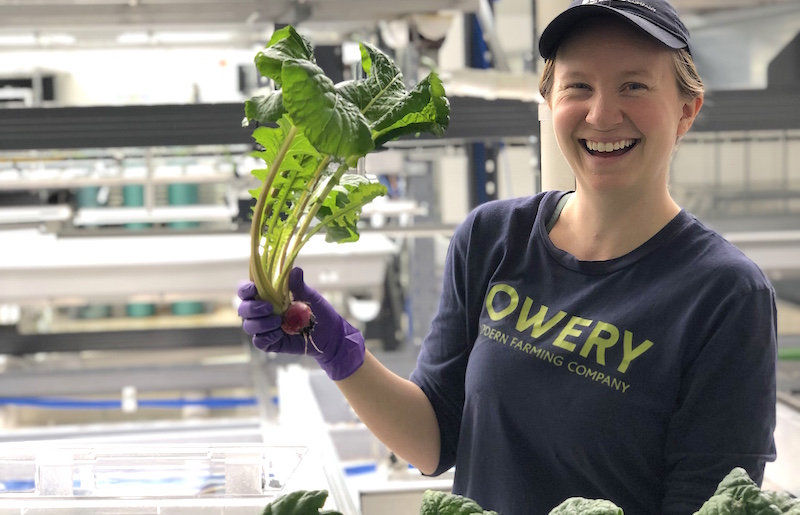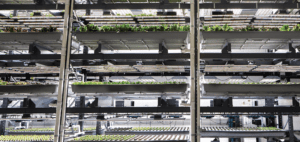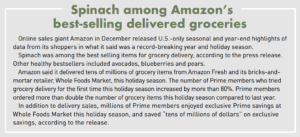

Feb 7, 2020Bowery Farming slides into local Amazon sales as online use grows
Online produce sales are a new and growing market – unchartered waters for many traditional growers.
Bowery Farming, a startup greens-growing operation in the Northeast, shows that the online market can indeed be navigated.
The company started in 2015 by Irving Fain was research-based at first, commercializing its products first in 2017. The company has been expanding rapidly – although representatives wouldn’t share sales figures or the square footage of its urban farms, it is opening a third location in 2020.
“One of the things Bowery has done a good job with was understanding the online channel,” said Bowery Farming Executive Vice President of Sales Carmela Cugini. Online sales make up only one or two percent of the overall produce market but, “it is growing, it’s going to be the next big boom, as you see with what is happening with Amazon Fresh, with Walmart Online Grocery, MMM Fresh, Peapod – all these online companies.
“Although people will always go to the grocery store – particularly for produce, because people just like that experience,” she said. But local sales don’t have to be restricted to storefronts; millennials do buy online. “When we think about how consumers choose, 53% of millennials seek out locally-grown produce,” so Amazon knows locally-grown produce matters.
Bowery Farming early on reached out to Amazon Fresh and determined they could use the service to sell only to local zip codes. The company typically meets with new customers to explain what sets it apart as a vertical farm that uses artificial intelligence and robotics in its operations. The second meeting, for serious customers, is usually a tour of the farm.
“Once they saw what we’re doing, they were incredibly enthused and asked us to start selling for them,” Cugini said.


How they grow
The group grows floor-to-ceiling at two warehouse-style farms in New Jersey – the third and largest of its farm operations is located in the Baltimore, Maryland area. They grow a variety of romaine, red and green oakleaf and butterhead lettuces in addition to arugula, bok choy, mustard greens and baby kale, and herbs: basil, parsley, cilantro. They have plans to add spinach next year, Cugini said.
Natural “white light” is mimicked by LED lights. The plants nestle into a peat substrate and are fed nutrients hydroponically, in a closed-loop system that recycles water. In this controlled environment, Bowery Farming can grow a variety of greens and herbs without pesticides and herbicides. Although hydroponic and aquaponic have been eligible for organic certification, Bowery and many other hydroponic growers haven’t pursued organic certification, but remain committed to the highest industry standards of indoor growing.
“At a Bowery farm, we implement many different types of strategies to ensure our growing environment produces high-quality leafy greens and herbs without the need for such inputs,” Cugini said. “A few strategies include management of irrigation water sourcing and quality, routine sanitation and a robust pest prevention program.”
Plants are also monitored by cameras and sensors.
“As a crop is growing, the cameras will take pictures and it will notice when something’s changing,” Cugini said. “It will go back into our learning algorithm and say, ‘I know when this happened before,’ and I can go back and make a change in real time, to adjust for anything from temperature, humidity, lighting.”
In that way, Bowery’s proprietary computer systems enable relatively inexperienced growers to make crop decisions. They can hire staff from the city centers.
“We don’t need farmers that have been doing this for years and years,” she said. “We can teach new people how to use our operating system to operate the farm.”


Making it to market
Selling locally online seems to work well for Bowery Farming as well as the websites. In addition to Amazon, Bowery has sold its goods on Jet.com and peapod.com.
The company’s forward-thinking technology, dedication to local sales and freshness/long shelf life were all traits that seemed to matter to the online retailers, Cugini said. Having well-organized, “tight” stock keeping units or SKUs was also important as was having an established cold chain was vital. Online marketing – proper content and search engine optimization – are also important.
“The other thing that’s helped us gain momentum has been the number of reviews that our products are getting,” Cugini said. “People are saying how fresh it is, how good it tastes, “I’ve never tasted butterhead (lettuce) this way, my kids like it.” The Bowery Farms sells produce under the brand name, which Cugini says customers identify with food safety and its flavors.
Being local helps ensure the freshness of the produce – it has very little distance to travel from farm to warehouse to the customer.
“The consumer still gets their produce within a couple days of harvest,” she said. “We do a lot of work online where we can control the zip codes because at the end of the day we don’t want to ship our stuff all over the country because we want to maintain that fresh, local proposition that we believe in so strongly for our consumer.”
— Stephen Kloosterman, associate editor














